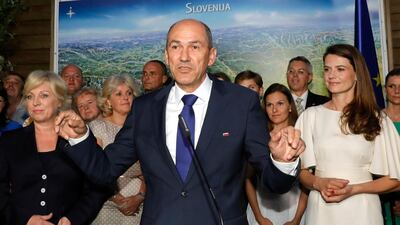The anti-immigration party of veteran centre-right leader Janez Jansa has emerged as the largest party in Slovenia’s parliamentary election on Sunday but may struggle to command a majority, almost final results suggest.
With about 98 per cent of votes counted, Mr Jansa’s SDS party appears to have secured just more than 25 per cent of the ballot – giving it 25 seats in the 90-seat assembly – and the "anti-establishment" LMS party of comedian-turned-politician Marjan Sarec is in second place on 12.7 per cent and 13 seats, the State Election Commission said.
During the campaign, Mr Jansa made a common cause of migration with fellow right-wing firebrand Hungarian prime minister Viktor Orban by evoking memories of more than 500,000 migrants who crossed Slovenia in late 2015 and early 2016 – although all except a handful of them continued on to northern Europe.
In a televised statement on Sunday evening, delivered with little triumphalism, the 59-year-old Mr Jansa said his party’s “door for talks and coalitions is open” to all other parties.
“We are ready to start serious talks based on the programme we have been working hard on,” he said.
He re-iterated his anti-migrant position saying migration was “the most serious challenge according to most Europeans”.
_______________
Read more:
Hungary's anti-migration leader secures sweeping victory
_______________
The only party that has so far said it would work with him, the centre-right Nova Slovenija, has won just 7.1 per cent and seven seats of the vote, leaving the two parties short of the 46 needed for a majority.
That leaves the second-placed LMS party potentially with a crucial role to play.
Speaking to the POP TV station after polls closed, Mr Sarec said he was “very happy” with the results, hinting that it could give him the opportunity to band together with other parties to keep Mr Jansa out of power.
During the campaign Mr Sarec said that Mr Jansa’s anti-immigration rhetoric and his appearances with the Hungarian PM “crossed all red lines”.
On Sunday evening Mr Sarec repeated his opposition to working with the SDS leader, saying: “We have said it so many times in public that we would not be trustworthy if we did.”
Mr Sarec had been criticised for his vague platform during the campaign but recently told AFP that his party “has many things in common with [French president Emmanuel] Macron’s position - a sensible, centrist orientation”.
The centre-left Social Democrats have finished in third place on just less than 10 per cent, followed by the SMC party of outgoing prime minister Miro Cerar on 9.7 per cent and the left-wing Levica party with 9.2 per cent.
Early elections were called in March after Mr Cerar threw in the towel following months of public-sector strikes and internal wrangling within his coalition. The last straw came when a supreme court verdict on a flagship infrastructure project went against the government.
On Sunday Mr Cerar told POP TV that the “results show that we [SMC] remain an important player on the political stage, and we will continue fulfilling our roll with responsibility”.
Just more than 51 per cent of the 1.7 million Slovenians eligible to vote went to the polls.
Mr Jansa’s political career stretches back to the country’s struggle for independence from Yugoslavia, and has already seen its fair share of drama. In 2013 he was forced to step down from a second term as prime minister over a corruption scandal and ran in the 2014 elections from jail – the conviction was later overturned.
In this campaign he promised to tackle the thorny issues of healthcare reform and disputes with neighbour Croatia, as well as promising tax cuts.
But it was his combative personality, strident anti-immigration rhetoric and alliance with Mr Orban that dominated the closing stages of the campaign.
Like right-wing leaders elsewhere, he has adopted a feisty presence on Twitter and has used it to defend his alliance with Mr Orban.
“Thanks to its [migration] policy, Hungary is a safe country while Belgium, due to its wrong policy, isn’t,” read a recent tweet from Mr Jansa, who first served as prime minister from 2004 to 2008.
Last month Mr Orban said a SDS victory “would ensure the survival of the Slovenian people”.
According to Slovenian media reports, Mr Jansa’s media campaign was also boosted by investments totalling about €2 million from Hungarian media companies in a TV station and newspaper co-owned by SDS.
For the first time in more than a decade, the elections took place against a backdrop of strong economic growth rather than financial crisis or recession.
But Mr Cerar’s government did not reap any political benefit from the turnaround, with his rivals focusing on growing hospital waiting lists and demands for higher pensions and wages and a better business environment.
Analysts say that in the near future political instability may well persist, whether under a right-wing Jansa-led government or one from the centre-left.

